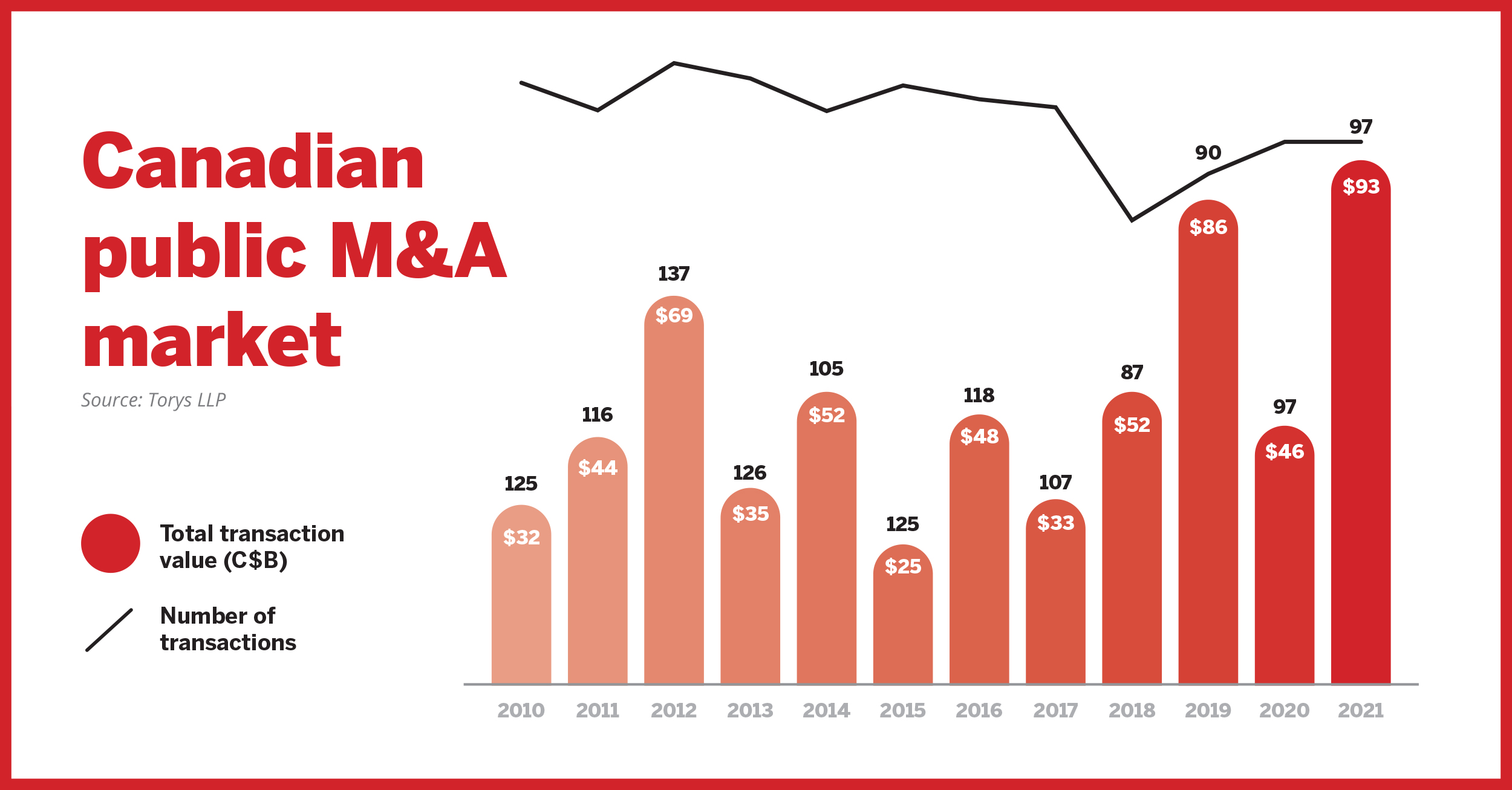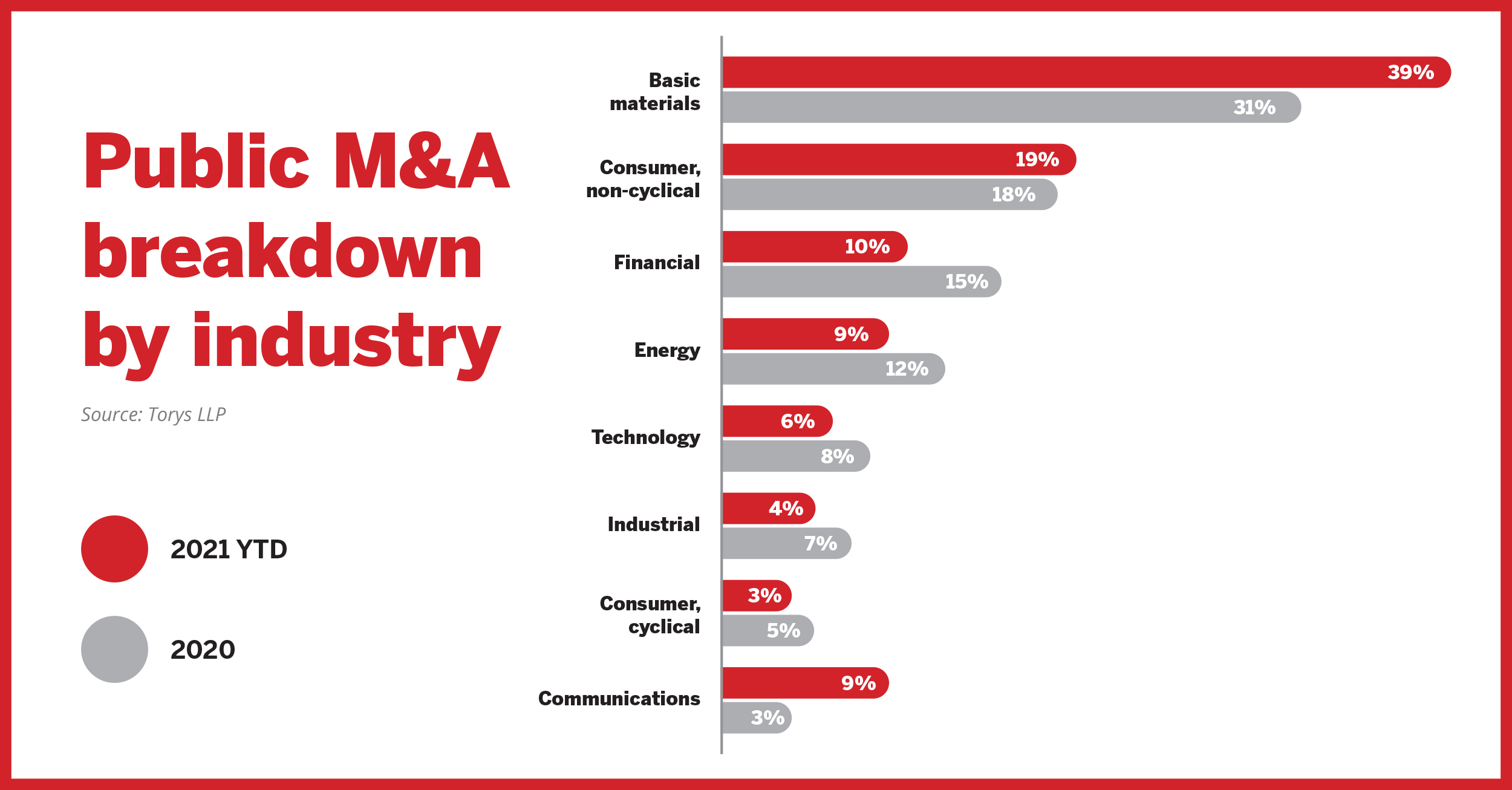

Jump to winners | Jump to methodology
When the COVID-19 pandemic began more than two years ago, corporate law boutiques and their big full-service colleagues worried that business would suffer. The thinking was that firms would be too risk-averse to dip their toes into capital markets, venture financing and mergers and acquisitions. Instead, after a brief pause early in the pandemic, dealmaking and related corporate activity came back with a roar.
“I think what we’ve seen over the past two years has exceeded everyone’s expectation,” notes Perry Dellelce at Wildeboer Dellelce. “I don't think there’s any question about that – nobody expected the market to be as buoyant as it was, and a lot of corporate firms, including the boutique, have done very well.”
“Businesses like the e-commerce space, educational tools for online learning and recruitment tool, for example, had accelerated growth during the pandemic”
Kyle Lavender, LaBarge Weinstein LLP

Lower interest rates, vibrant capital markets, pent-up demand, and “this insatiable thirst for growth” led to this “hyperactivity over the past two years,” he says. But Dellelce adds that what should not be dismissed “is how entrepreneurs, corporate executives, and financiers had more time to think a bit and come up with bold new ideas” for growing their businesses.
“They’re sitting at home, COVID-19 allows them to think creatively, and they come up with ideas that they can execute,” he says. Or there are business owners who had been thinking about a succession plan or retirement, “and the pandemic gave them the perfect opportunity to do some estate planning and move on to the next phase in their life.”
Kyle Lavender, with LaBarge Weinstein LLP, agrees it was a tough time for corporate law firms. “At the beginning of the pandemic, there was a lot of concern about the unknown. But what ended up happening was that things exploded, especially in the tech and venture capital space. We ended up having the best deal flow for venture capital ever in Canada,” he says.
Lavender points to an accelerated shift towards specific industries in the technology space that would not have otherwise happened. “Businesses like the e-commerce space, educational tools for online learning and recruitment tools, for example, had accelerated growth during the pandemic."
Whatever the reasons, the firms on Canadian Lawyer’s Top 10 Corporate Law Boutiques list for 2022–2023 were able to meet the momentum of their clients, helping their growth through the pandemic and beyond.
“The undeniable reality is that shareholder wealth maximization is no longer enough to make a public corporation thrive”
Dennis Peterson, Peterson McVicar LLP
From the Davos Manifesto of 2020 to the decision of Netflix to suspend its services in Russia in response to its invasion of Ukraine, lawyers are pointing to how the “stakeholder capitalism” model is becoming an ever-important feature of corporate law.
“While critics argue for other approaches such as customer capitalism, the undeniable reality is that shareholder wealth maximization is no longer enough to make a public corporation thrive,” says Dennis Peterson, a founding partner at Peterson McVicar LLP in Toronto. He sees a “new era” of corporate citizenship, with law firms such as his becoming more involved with businesses that are becoming “responsible and global” corporate citizens.
Jennifer Allen, a partner at winning corporate boutique Allen McDonald Swartz LLP in Toronto, also notices that environmental, social, and governance (ESG) factors are becoming more entwined with corporate strategy and transactions. Law firms dealing with these clients see the importance of staying ahead of this trend.
The environmental factors she points to include pollution, energy, and water use; waste management; resource extraction; and climate change. Social factors include diversity and equity; employee treatment, satisfaction, and compensation; working conditions and human rights; health and safety; data protection and privacy; community relations; and customer satisfaction.
As for governance factors, Allen says shareholder and stakeholder engagement is becoming a more prominent feature of corporate culture, as are internal codes of conduct and policies, executive compensation, board diversity, political contributions and lobbying, audit practices, and transparency.
Peterson points to the increased focus on carbon reduction and environmental responsibility as part of this trend.
“An idea with its roots firmly within stakeholder capitalism, the drive for carbon neutrality continues to gain prominence,” he says. He notes events such as EV maker Rivian’s IPO in November, raising US$12 billion, and the recent launch of Amazon Aware, a new line of eco-friendly essentials in categories like apparel and skincare, as part of the increasing focus on environmental sustainability. He says this trend figures much in his firm’s two focus areas: technology and natural resources.
“Our clients have dedicated considerable resources and time to ensuring that they continue to minimize and reduce their environmental footprint,” he says, “and Peterson McVicar has been working hard with clients to help in these areas while meeting their strategic goals.”
“Clients want a true partner and adviser to guide them through the M&A journey. This has benefited corporate law boutiques [that] want the sophisticated advice and high-touch service that a corporate law boutique will provide”
Jennifer Allen, Allen McDonald Swartz LLP
Allen at AMS says that while it has been “a seller’s market” in the world of M&A, among the more prominent contributors to M&A activity has been the area of health technology, especially as developments in science and technology have coincided with the pandemic shining a light on the importance of this sector. While activity still seems relatively buoyant, “that may change if there is a significant increase in interest rates.”
While it has been a “hot” market for M&A during most of the COVID-19 pandemic, some features that help deal with transactional risk have become prominent. One example Allen points to is the use of representation and warranty insurance in many deals, especially when private equity is involved, she says, and more often on the sell side of a deal.
Allen says another feature in M&A these days is the increasing use of earnouts to bridge any value gap perceived between buyers and sellers. These earnout agreements help get a deal done, breaking any log jam in negotiations. A classic earnout is a post-closing increase in the purchase price based on the acquisition target meeting specific purchase targets and is paid by the buyer to the seller.
While less common, there are also “reverse earnouts” where the purchaser pays the maximum amount for the target at closing. If the agreed-upon performance target is not met, the seller agrees to pay an agreed-upon portion of the purchase price.
Allen says that corporate boutiques such as the one she is with have benefitted from the rise in M&A activity. “Clients want a true partner and adviser to guide them through the M&A journey,” she says. “This has benefited corporate law boutiques as some clients have decided that they want the sophisticated advice and high-touch service that a corporate law boutique will provide.”

Peterson notes that while there has been “somewhat of a receding focus” on technology as the pandemic wanes from the collective consciousness, change from technological innovation is continuing to transform the practice of securities law.
“The emergence of new technological domains such as machine learning, blockchain, and the metaverse has created a plethora of innovative ideas,” he says. “These ideas were and continue to be commercialized into emerging companies, and we expect this trend to accelerate.”
Kevin West, a partner at winning firm SkyLaw, agrees. Indeed, West says he founded the practice in 2010 after spending a decade at larger firms because he realized he had a lot of friends and acquaintances “who were doing a lot in the tech space but couldn’t pay the big firm rates to put their ideas in motion.”
He points to working with an artificial intelligence start-up “where they have these really cool games in the metaverse, where you can choose your own adventure – I don’t even understand it all, but it’s just fascinating, and we help them with their corporate work.”
Another company SkyLaw has worked with is a producer of reusable take-out containers for restaurants. It helps solve a problem many people who have ordered take-out during the pandemic can relate to – what to do with all the containers sitting in one’s cupboard and finding a better way to deal with them.
West says his client’s idea is to make containers with barcodes. “When you’re done with the containers, you drop them off, the barcode is scanned and they can be reused,” he says. It is not that different from the system used in returning beer bottles. “It’s a great business idea that could help save the environment.”
“The nice thing about being a boutique corporate firm,” West adds, is that “there is a lot more flexibility on fees, so I can do the higher-end corporate work, but also do a lot of start-ups and non-profits, and everything in between.”
In the future, Dellelce expects corporate law boutiques to deal with more work in emerging areas such as the metaverse, cryptocurrency and the virtual world. Add to that a heightened focus on areas of ESG such as diversity, climate change and corporate transparency, he says, and corporate law firms will have their hands full helping clients meet their goals.
Canadian Lawyer asked lawyers, in-house counsel, and clients from across Canada to vote on which corporate law boutiques in the country represented the best in class. For the survey, which took place between Jan. 3 and 28, 2022, respondents were asked to rank the top firms from a long list provided. They were also given the option of adding a firm not included in that list. The survey respondents’ rankings were based on the regional service coverage, client base, notable mandates, service excellence and legal expertise of the firms.
To qualify for our list and be voted for in our survey, firms were required to derive at least 80 percent of their work from corporate law and have more than one lawyer in this practice area.
In total, 578 ballots were cast for 38 corporate law firm candidates on our list. The final rankings were determined through a points system, in which firms were rewarded on a sliding scale for the number of first- to 10th-place votes received. Voters had to rank a minimum of five firms. The quantitative results are combined with results of the Lexpert peer survey when applicable and feedback from respected senior members of the bar.
Canadian Lawyer readers’ opinions are reflected in this report. If you do not see a corporate law boutique you feel should be nominated for the next survey, please let us know.